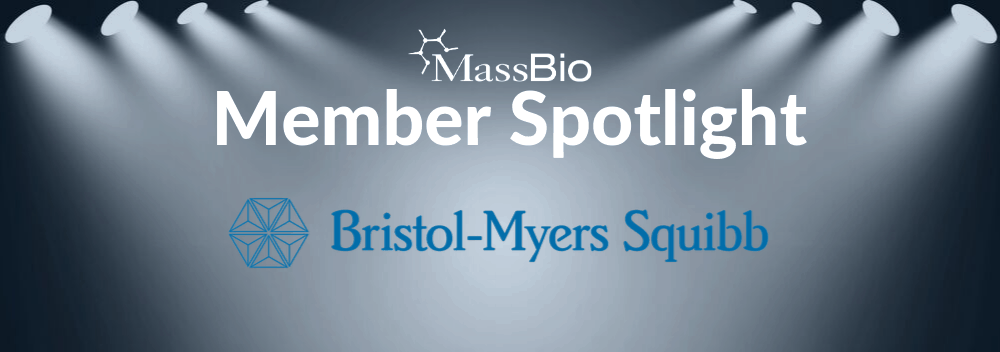
Every month, MassBio spotlights a member company and the great work they’re doing to advance the life sciences industry and support the patients we serve. In October, we spoke with Saurabh Saha, M.D., Ph.D., SVP, Global Head of Translational Medicine and Cambridge Site Head at Bristol-Myers Squibb. In his role, Saurabh leads the hundreds of world-class researchers that make up Bristol-Myers Squibb’s translational medicine team. This innovative group aims to integrate scientific understanding into portfolio decision-making in order to enable and expedite the discovery and development of new medicines for patients. Prior to joining Bristol-Myers Squibb, Saurabh served as a venture partner at Atlas Venture, holding leadership positions across many of its portfolio companies, including CEO of Delinia.
Tell us about your organization, its mission and current initiatives.

Bristol-Myers Squibb is a global biopharmaceutical company whose mission is to discover, develop and deliver innovative medicines that help patients prevail over serious diseases. Our newest R&D site, sitting in the heart of Cambridge’s vibrant innovation ecosystem, is home to a fully integrated drug discovery and translational medicine organization. With state-of-the-art laboratories, a team of leading researchers and close proximity to academic and industry partners, our Cambridge facility is well-positioned to deliver on our vision of transforming outcomes for patients. In addition to our Cambridge R&D site, Massachusetts is also home to our Devens facility, which supports process development as well as clinical and commercial manufacturing for biologics medicines.
How does your organization’s activities help patients now and into the future?
Our teams are spearheading the most nascent stages of drug discovery, through molecular discovery technologies and discovery platform chemistry. Our translational medicine team is improving confidence in clinical outcomes, providing new scientific insights and accelerating our hypothesis-to-data time to make informed decisions with hopes of increasing the speed and success of drugs in the clinic. A site-wide commitment to collaboration and information sharing means no insight is being evaluated in a silo – our teams work diligently to put the larger puzzle pieces together, in hopes of discovering new therapies that can help patients in need.
What do you see as the biggest challenge facing the life sciences industry today?
One of the largest hurdles facing the industry is sustaining sufficient innovation to rapidly address patient needs. At Bristol-Myers Squibb, we’re utilizing emerging technologies (e.g., artificial intelligence and deep learning, genomics, imaging, digital pathology, bioinformatics and novel diagnostics, etc.) to address this issue by enabling scientists to gather and analyze the most accurate, comprehensive data in the shortest amount of time. This helps us validate hypotheses, reimagine clinical trial designs, select novel endpoints and gather essential insights to predict outcomes more accurately and quickly. Ultimately, we believe the combination of these efforts and what we learn from them will inform strategic decisions and lead us to our goal of uncovering life-changing treatments for some of the most challenging diseases.
What’s next for your organization / what are you focused on in the coming year?
Since leading the development of the first immuno-oncology treatments, we continue to ask – “why do some cancers remain unresponsive to immuno-oncology therapy?” One of our main focuses in our Cambridge site, and at other R&D sites across the country, is answering that question. Investments in next-generation science as I mentioned earlier, including experimental research, clinical mechanisms, bioinformatics and pathology, will enhance our understanding of resistance mechanisms and help uncover why some patients never respond to I-O therapy, and others stop responding after a period of time. Paired with some of the nation’s top cancer research institutions in our backyard, our Cambridge presence allows for rapid knowledge sharing with other leaders who are also working to tackle this challenge.
If you’re interested in being featured in MassBio’s Member Spotlight, please see guidelines here.